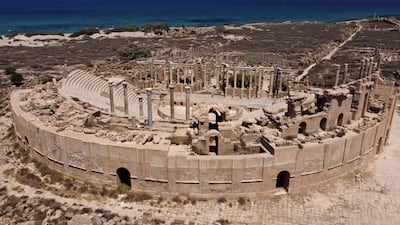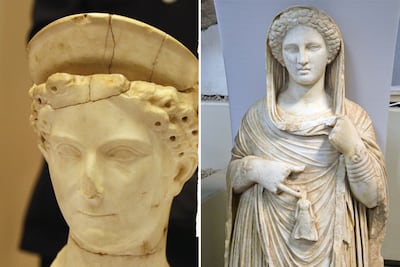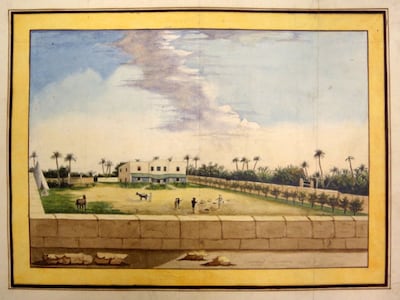“Our client has asked us to inform you that the columns will not be returned to Libya.” That was the terse response from lawyers acting for the Crown Estate of Queen Elizabeth II to a lawyer battling to reclaim artefacts from the Roman settlement of Leptis Magna for his homeland.
Acting for Libya, London-based Mohamed Shaban has submitted a formal request for the return of the ancient ruins from a wooded glade in Windsor Great Park that features, screened away from public view, a collonaded section that was spirited out of North Africa in 1816.
But if finality in the matter was the intended aim, the Crown Estate’s curt reply has only spurred on the British-Libyan lawyer leading efforts to reclaim the 2,000-year-old Roman relics taken from Libya by the UK.
After attempts at an amicable restitution were "repeatedly dismissed", Mr Shaban told The National he had moved to seek mediation through the UN’s heritage body, Unesco.
Mr Shaban said he sent letters to the Crown Estate in October 2021 requesting the repatriation of historic stoneworks that in the 19th century were taken by a British diplomat from the ancient site of Leptis Magna near Tripoli.
The UK-qualified lawyer, who is representing the state of Libya, said he had been disappointed with the responses he received from the legal team acting for Queen Elizabeth – on whose land the ruins currently reside – in the six months since he first made contact.
“Besides polite emails saying ‘we will get back to you’, I received nothing substantive for months. I think they’re hoping we’ll get over it,” said Mr Shaban, who told The National he took on the case after repeatedly hearing complaints about it from members of the community.
“Having a part of our heritage in the crown’s estate has definitely touched a nerve with Libyans,” he said.
“Morally, there is no question in our view that this heritage was stolen from the people and should be returned to them.”

How Libya's ancient ruins ended up in England
Named after the Roman city on the shores of the Mediterranean from where they came, the Leptis Magna ruins are a Unesco world heritage site.
Under the rule of Emperor Septimius Severus, who lavished Leptis with wealth during the second century AD, the city became the third most important city in Africa, rivalling Carthage and Alexandria.
Over the centuries, the city became a quarry for local people, and later a site of colonial plunder for the British and French, whose King Louis XIV took about 600 columns from Leptis Magna to use in his palaces at Versailles and Paris.
Barbary Coast turmoil
In 1816, after apparently being captivated by the sight of the Roman ruins, the British Consul General of Tripoli, Hanmer Warrington, decided to take some of the ancient stonework to England.
That was also the year that parts of the Parthenon in Greece were removed and shipped off to the UK by another British diplomat, Thomas Bruce, also known as the Seventh Earl of Elgin.
Athens has long been pushing for the return of the so-called Elgin Marbles, claiming they were taken, not given as a gift, and amount to stolen spoils of colonialism.
Perhaps inspired by the Earl of Elgin’s antiquities grab, Warrington persuaded the local Ottoman governor to let him help himself to the relics of Leptis Magna on behalf of the British crown.
The stonework treasures included 22 granite columns, 15 marble columns, 10 capitals, 25 pedestals, seven loose slabs, 10 pieces of cornice, five inscribed slabs and various fragments of figure sculpture and grey limestone.
Initially, the stones were deposited with the British Museum, but in 1828 they were erected by King George IV’s architect, Sir Jeffry Wyatville, at Virginia Water in Windsor Great Park.
Supplanted into an artificially constructed Temple of Augustus, the columns are now a Grade II listed property of the Crown Estate.

Libya versus the Queen? 'Nothing is off the table'
The Crown Estate claims that the stones in its possession were a gift. Libya, however, says there is no proof that Warrington legally acquired the ruins while on his diplomatic mission in North Africa, and that he simply stole them.
“We invited Windsor to provide evidence of the columns’ legal provenance but have been repeatedly ignored,” Mr Shaban told The National.
“Their most recent response has been a curt two-line letter saying they will not be returning the columns to Libya ... it is rather insulting and a desperately inadequate response.”
The London-based solicitor has been involved in repatriating looted artefacts from Libya before.
After a 2,000-year-old funerary statue of the Greek goddess Persephone was stolen from the ancient city of Cyrene in Libya in 2011 and taken to the UK, Mr Shaban represented the North African country during the legal case to return the artefact.

The arbitration expert also successfully negotiated the return to Libya of a Roman statue of Princess Donatella Flavia – also stolen from Libya during the civil war – which was mistakenly sold by Christie's in 2011.
Mr Shaban says Libya is aggrieved by the Crown Estate’s lack of meaningful engagement with him on the Leptis Magna columns and told The National their attitude highlighted a certain “arrogance” and “hypocrisy”.
“This is a very imperial and arrogant way of doing things. We are told that British values are ‘to do the right thing’, but the right thing is to return what rightfully belongs to the Libyan people.
“I don’t think they’ve covered themselves in glory,” Mr Shaban said of the queen’s lawyers.
A spokesperson for the Crown Estate said the Leptis Magna columns “remain on public display and are an important and valued feature of the Virginia Water landscape. They continue to be enjoyed by the millions of visitors to Windsor Great Park each year”.
Mr Shaban replied: “They seem to be using that as an excuse not to return the artefacts. This is of course nonsensical, rather comical and even insulting. Using their logic, we can take some stones from Hadrian’s Wall, plonk them in another country and refuse to return them because 'millions of tourists are enjoying' them.”
The National was unable to visit the columns in person because they have been closed to the public for maintenance work for several months.

The UK is a signatory to several international treaties on the protection of cultural property, although they were all signed "long after these columns were taken", Mr Shaban said.
Nevertheless, he hopes a growing recognition among institutions of their role in the colonial-era plunder of cultural heritage may encourage Queen Elizabeth to follow suit.
Among the recent restitutions are: Benin bronzes to Nigeria from the University of Aberdeen and the University of Cambridge; locks of hair from Abyssinian Emperor Tewodros II to Ethiopia from the National Army Museum; and royal regalia to Myanmar by the Victoria and Albert Museum.
But the British Museum – one of the largest hoarders of cultural artefacts from around the world – continues to resist calls for the return of looted objects in its possession, most famously, the Parthenon Elgin Marbles.
After years of acrimonious dispute, a Unesco committee recently recommended that the UK government reconsider its position on the Parthenon Marbles and enter into talks with Greece.
While Mr Shaban hoped for an "amicable route" to repatriation of the Leptis Magna columns, his experience so far dealing with the Crown Estate has left him less confident of that becoming reality.
“We have shown great respect so far, and we have perhaps not had the respect that we deserve. For us, now, nothing is off the table.”


